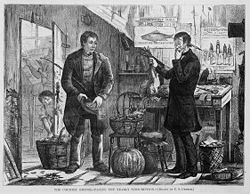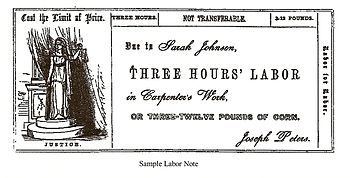- Barter
-
For other uses, see Barter (disambiguation).A 19th-century example of barter: A sample labor for labor note for the Cincinnati Time Store. Scanned from Equitable Commerce by Josiah Warren (1846)

Part of a series on Economic systems Ideological systems Anarchist · Capitalist
Communist · Corporatist
Fascist · Georgist
Islamic · Laissez-faire
Market socialist · (Neo-) Mercantilist
Participatory
Protectionist · Socialist
SyndicalistSystems Closed (Autarky) · Digital
Dual · Gift · Informal
Market · Mixed · Natural
Open · Planned · Robinson Crusoe economy · Subsistence
Underground · VirtualSectors State Sector · Private sector
Marketization · Expropriation
Voluntary sector · Nationalization
Privatization · Municipalization
Liberalization · Corporatization
Deregulation · Socialization
Collectivization · Common ownership
FinancializationOther types of economies Anglo-Saxon · Feudal
Global · Hunter-gatherer
Information
Newly industrialized country
Palace · Plantation
Post-capitalist · Post-industrial
Social market · Socialist market
Token · Traditional
Transition · Barter
State capitalist · State-directed · State monopoly capitalistBusiness and
economics portalBarter is a method of exchange by which goods or services are directly exchanged for other goods or services without using a medium of exchange, such as money.[1] It is usually bilateral, but may be multilateral, and usually exists parallel to monetary systems in most developed countries, though to a very limited extent. Barter usually replaces money as the method of exchange in times of monetary crisis, such as when the currency may be either unstable (e.g., hyperinflation or deflationary spiral) or simply unavailable for conducting commerce.
Contents
History
 An 1874 newspaper illustration from Harper's Weekly, showing a man engaging in barter: offering chickens in exchange for his yearly newspaper subscription.
An 1874 newspaper illustration from Harper's Weekly, showing a man engaging in barter: offering chickens in exchange for his yearly newspaper subscription.
Contrary to popular conception, there is no evidence of a society or economy that relied primarily on barter.[2] Instead, non-monetary societies operated largely along the principles of gift economics. When barter did in fact occur, it was usually between either complete strangers or would-be enemies.[3]
While one-to-one bartering is practised between individuals and businesses on an informal basis, organized barter exchanges have developed to conduct third party bartering. A barter exchange operates as a broker and bank in which each participating member has an account that is debited when purchases are made, and credited when sales are made. Compared to one-to-one bartering, concerns over unequal exchanges are reduced in a barter exchange.[citation needed]
Modern trade and barter has developed into a sophisticated tool that can sometimes help businesses increase their efficiencies by monetizing their unused capacities and excess inventories. The worldwide organized barter exchange and trade industry has grown to an $8 billion a year industry and is used by thousands of businesses and individuals. The advent of the Internet and sophisticated relational database software programs has made it easier to conduct these activities and has further advanced the barter industry's growth. Organized barter has grown globally to the point where virtually every country now has a formalized barter and trade network of some kind. Complex business models based on the concept of barter are today possible since the advent of Web 2.0 technologies.[citation needed]
Bartering benefits companies and countries that see a mutual benefit in exchanging goods and services rather than cash, and it also enables those who are lacking hard currency to obtain goods and services. To make up for a lack of hard currency, Thailand's township, Amphoe Kut Chum, once issued its own local scrip called Bia Kut Chum: Bia is Thai for cowry shell, was once 1⁄6400 Baht, and is still current in metaphorical expressions. Running afoul of national currency laws, the community changed to barter coupons called Boon Kut Chum that bear a fixed value in baht, which they swap for goods and services within the community.[4]
Trade exchanges
A trade or barter exchange is a commercial organization that provides a trading platform and bookkeeping system for its members or clients. The member companies buy and sell products and services to each other using an internal currency known as barter or trade dollars. Modern barter and trade has evolved considerably to become an effective method of increasing sales, conserving cash, moving inventory, and making use of excess production capacity for businesses around the world. Businesses in a barter earn trade credits (instead of cash) that are deposited into their account. They then have the ability to purchase goods and services from other members utilizing their trade credits – they are not obligated to purchase from who they sold to, and vice-versa. The exchange plays an important role because they provide the record-keeping, brokering expertise and monthly statements to each member. Commercial exchanges make money by charging a commission on each transaction either all on the buy side, all on the sell side, or a combination of both. Transaction fees typically run between 8 and 15%.[citation needed]
It is estimated that over 350,000 businesses in the United States are involved in barter exchange activities. There are approximately 400 commercial and corporate barter companies serving all parts of the world. There are many opportunities for entrepreneurs to start a barter exchange. Several major cities in the U.S. and Canada do not currently have a local barter exchange. There are two industry groups, the National Association of Trade Exchanges (NATE) and the International Reciprocal Trade Association (IRTA). Both offer training and promote high ethical standards among their members. Moreover, each has created its own currency through which its member barter companies can trade. NATE's currency is the known as the BANC and IRTA's currency is called Universal Currency (UC).[citation needed]
The first exchange system was the Swiss WIR Bank. It was founded in 1934 as a result of currency shortages after the stock market crash of 1929. "WIR" is both an abbreviation of Wirtschaftsring and the word for "we" in German, reminding participants that the economic circle is also a community.[citation needed]
Corporate barter
Corporate barter focuses on larger transactions, which is different from a traditional, retail oriented barter exchange. Corporate barter exchanges typically use media and advertising as leverage for their larger transactions. It entails the use of a currency unit called a "trade-credit". The trade-credit must not only be known and guaranteed, but also be valued in an amount the media and advertising could have been purchased for had the "client" bought it themselves (contract to eliminate ambiguity and risk).[citation needed]
Internet bartering
Swapping is the increasingly prevalent informal bartering system in which participants in Internet communities trade items of comparable value on a trust basis using the Internet. The most notable disadvantage to electronic barter is inherent in Internet commerce, that of trust. How can consumers have confidence that they will receive what they bargained, or paid, for? Although the Internet based consumer market has by its continued existence and growth demonstrated that it works, there is never a guarantee of satisfaction in consumer to consumer transactions. There is no absolute defense against fraud. However, it can be argued that when a person barters there is less incentive to deliberately mislead. Neither party is paid; each party receives something that would only then have to be converted to cash.[citation needed]
Barter markets
In Spain (particularly the Catalonia region) there is a growing number of exchange markets[5]. These barter markets or swap meets work without money. Participants bring things they do not need and exchange them for the unwanted goods of another participant. Swapping among three parties often helps satisfy tastes when trying to get around the rule that money is not allowed.[6]
According to the International Reciprocal Trade Association, the industry trade body, more than 400,000 businesses transacted $10 billion globally in 2008 — and officials expect trade volume to grow by 15% in 2009.[7]
Environmental implications
Barter complements the environmental movement that has gained traction in the late 20th and early 21st centuries. The expenditure of resources involved in the manufacture and distribution of new products is concomitantly reduced by trading existing products. A global market for barter mitigates waste and acts as a counterpoint to the disposable economy. Consumer and small business websites such as BarterQuest.com promote bartering as a green alternative to buying and selling.[8]
Tax implications
In the United States, the sales a barter exchange makes are considered taxable revenue by the IRS and the gross amount of a barter exchange member's sales are reported to the IRS by the barter exchange via a 1099-B form. The requirement for barter exchanges to report members' sales was enacted in the Tax Equity and Fiscal Responsibility Act of 1982. According to the IRS, "The fair market value of goods and services exchanged must be included in the income of both parties."[9]
Other countries do not have the reporting requirement that the U.S. does concerning proceeds from barter transactions, but taxation is handled the same way as a cash transaction. If one barters for a profit, one pays the appropriate tax; if one generates a loss in the transaction, they have a loss. Bartering for business is also taxed accordingly as business income or business expense. Many barter exchanges require that one register as a business.[citation needed]
Limitations of a barter economy
Need for presence of double coincidence of wants: For barter to occur between two people, both would need to have what the other wants.
- Absence of common measure of value: In a monetary economy, money plays the role of a measure of value of all goods, so their values can be measured against each other; this role may be absent in a barter economy.
- Indivisibility of certain goods: If a person wants to buy a certain amount of another's goods, but only has for payment one indivisible unit of another good which is worth more than what the person wants to obtain, a barter transaction cannot occur.
- Lack of standards for deferred payments: This is related to the absence of a common measure of value, although if the debt is denominated in units of the good that will eventually be used in payment, it is not a problem.
- Difficulty in storing wealth: If a society relies exclusively on perishable goods, storing wealth for the future may be impractical. However, some barter economies rely on durable goods like pigs or cattle for this purpose.
See also
- Gift economy
- Hyperinflation
- International trade
- List of international trade topics
- Local currency
- Local Exchange Trading System
- Natural economy
- Private currency
- Property caretaker
- Quid pro quo
- Reciprocity (cultural anthropology)
- Simple living
- Trading cards
- International Reciprocal Trade Association
- Time Banking
References
- ^ O'Sullivan, Arthur; Steven M. Sheffrin (2003). Economics: Principles in Action. Pearson Prentice Hall. p. 243. ISBN 0-13-063085-3.
- ^ Mauss, Marcel. 'The Gift: The Form and Reason for Exchange in Archaic Societies.' pp. 36-37.
- ^ Graeber, David. 'Toward an Anthropological Theory of Value'. pp. 153-154.
- ^ A Boon to Kut Chum archive
- ^ Homenatge A Catalunya II (Motion Picture). Spain, Catalonia: IN3, Universita Oberta de Catalunya, Creative Commons Licence.. 2010. http://www.homenatgeacatalunyaii.org/en. Retrieved Jan-2011. "A documentary, a research, a story of stories about the construction of a sustainable, solidary economics and decentralized weaving nets that overcome the individualization and the hierarchical division of the work, 2011."
- ^ Barcelona's barter markets (from faircompanies.com. Accessed 2009-06-29.)
- ^ TIMES, nov. 2009
- ^ http://www.youtube.com/watch?v=cP13vZ91P7k
- ^ Tax Topics - Topic 420 Bartering Income. United States Internal Revenue Service. http://www.irs.gov/taxtopics/tc420.html
Categories:- Business terms
- Commerce
- Pricing
- Simple living
- Tax avoidance
- Trade
- Economic systems
Wikimedia Foundation. 2010.

